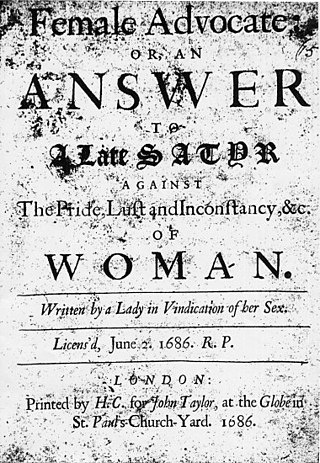
John Dryden was an English poet, literary critic, translator, and playwright who in 1668 was appointed England's first Poet Laureate.

Mary Leapor (1722–1746) was an English poet, born in Marston St. Lawrence, Northamptonshire, the only child of Anne Sharman and Philip Leapor (1693–1771), a gardener. She, out of the many labouring-class writers of the period, was noticeably well received.
Sarah, Lady Piers was an English literary patron, political commentator, and a poet.

Mary Davys (1674?–1732) was an Irish novelist and playwright.

Elizabeth Bentley (1767–1839) was an English poet, one of a small wave of British and Irish writers from the labouring classes in the eighteenth century. She was a local poet who was nonetheless engaged with larger political and social issues.

Sarah Fyge Egerton (1668–1723) was an English poet who wrote in the late seventeenth and early eighteenth centuries. In her works The Female Advocate and Poems on Several Occasions, Egerton wrote about gender, friendship, marriage, religion, education, politics, and other topics. She is chiefly known as the spirited teen who responded in defense of women to Robert Gould's misogynist satire.

Alicia D'Anvers [née Clarke] was an English poet known for her satires of academic life.

Elizabeth Egerton, Countess of Bridgewater was an English writer who married into the Egerton family.
The academic discipline of women's writing is a discrete area of literary studies which is based on the notion that the experience of women, historically, has been shaped by their sex, and so women writers by definition are a group worthy of separate study: "Their texts emerge from and intervene in conditions usually very different from those which produced most writing by men." It is not a question of the subject matter or political stance of a particular author, but of her sex, i.e. her position as a woman within the literary world.
Henrietta Battier was an Irish poet, political satirist, and sometime actress. She is best known for the squibs she published as "Pat. Pindar" and other pen-names. A subscriber to the United Irish test, she embraced the causes of Catholic-Protestant unity, representative government, and national independence.

Mary Scott (1751/52–1793), who became Mary Taylor after her marriage, was an English poet originating from Milborne Port, Somerset. Notable for her literary contributions, Scott authored "The Female Advocate" in 1774, a work advocating for women's participation in writing and literature.
Ann Jebb was an English political reformer and radical writer who published on both political and theological topics.
Elizabeth Thomas [née Wolferstan] (1771–1855), novelist and poet, is an ambiguous figure. Details of her early life are missing, and her authorship of some of the works attributed to her has been contested due to the use of pseudonyms.

Elizabeth Thomas was a British poet and letter writer. She was part of an important artistic group in London and John Dryden named her "Corinna". However, she suffered from lifelong financial precarity, romantic disappointment, and latterly, health problems. Her reputation was damaged by Alexander Pope and she spent three years in a debtor's prison near the end of her life.
Nationality words link to articles with information on the nation's poetry or literature.

Fanny Margaretta Holcroft (1780–1844), daughter of writer Thomas Holcroft, was a novelist, dramatist, and translator whose work aligned with the progressive tumult of the revolutionary period.

Jane Warton was a British writer. She published poetry, essays, conduct literature, and a novel, and was a member of a literary family.











